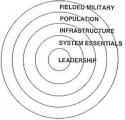
Originally Posted by
John T. Fishel

My understanding of the origin of "ends, ways, and means" is the same as yours - Art Lykke did put it in an article that found its way into - or was written for - the earliest editions of the AWC course 2 book on strategy. We used the article at Leavenworth as well - I think you did when you were there. You are correct as well that the construct leaves things out. The FAS test, which you mentioned on a different threat, was part of the original Lykke article but NOT part of the construct itself. It is the FAS test that addresses the problem you raise in your post of cost-benefit analysis. You may well be right that this was one of the major problems with Iraq strategy even though it seems obvious today. (That's the kind of thing that we labelled in SWORD [the Southcom Small Wars Operations Research Directorate] the "almost obvious" - an aha moment.)
There is one other failing that a limited reading of the construct has. It is dependent on a prior estimate of the situation or strategic appraisal. That too, I think you are arguing, was badly flawed with respect to Iraq. Indeed, it was. In general, if the strategic appraisal is wrong, then the strategy will fail regardless of how well linked are the ends, ways, and means and how well it does when subjected to the FAS test. In the Iraq case, the strategic appraisal was wrong and the original strategy also failed the FAS test - especially the Acceptability part which directly addresses costs v benefits.
Cheers
JohnT
But, in government, only the military does it well - and not all the time. Among the many definitions of strategy is: strategy is the process of relating ends to means (through ways). Here is my army bias coming through: I see strategy in ends, ways, and means terms - objectives, courses of action, and resources. But even Army people and our Navy, Air Force, and Marine brothers, do not always get it right often slighting the resource component of strategy. this was true of the SOUTHCOM Regional Security Strategy that I was responsible for in 1988 - 89. We did it better, by far, in Max Thurman's SOUTHCOM STRATEGY of 1989 because he insisted on beefing up the resource component and adding a formal IO supporting strategy.








 ) -- however, I doubt, regardless of campaign rhetoric that we'll do that. We're gonna be there a while...
) -- however, I doubt, regardless of campaign rhetoric that we'll do that. We're gonna be there a while... 





Bookmarks